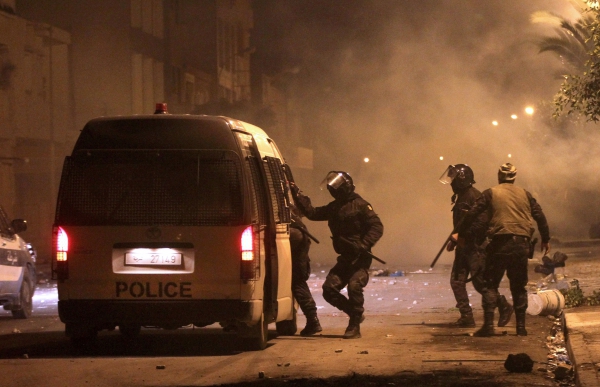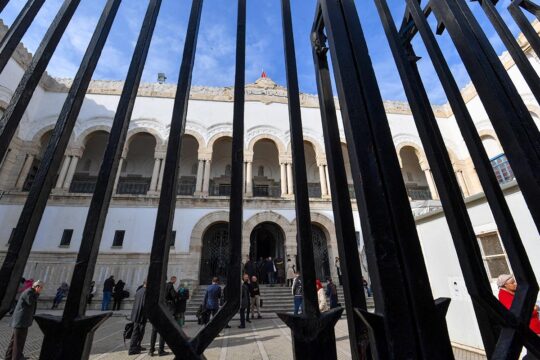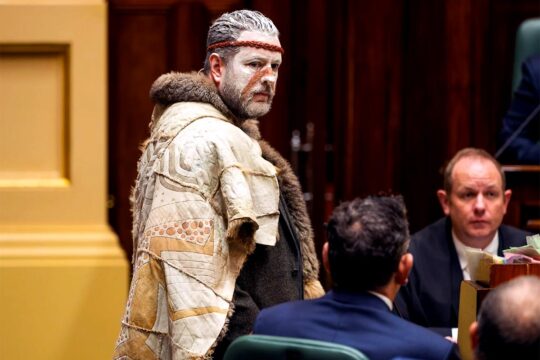Human Rights Watch recently published two reports on the human rights situation in Tunisia. One concerns police brutality during a wave of protests in January 2018, and the second is part of a 2018 World Report on human rights situations. Amna Guellali, Tunisia director at Human Rights Watch, tells Justiceinfo.net in this interview about the mixed picture of human rights in Tunisia today.
JusticeInfo.net: During popular protests this January against the rising cost of living, the authorities called activists of Fech Nestanew (“What are we waiting for?”) hooligans, and accused them of vandalism. Is that true?
Amna Guellali: It is clear that there were some acts of violence that HRW considers reprehensible, but there is not yet any precise evaluation of these protests. The demonstrations were sparked by popular anger and made legitimate demands, which should have been answered with social policies. In any case, acts of vandalism do not justify the criminalization of a broad social movement, nor labelling all protestors as hooligans. Such responses by the authorities and some media, lumping peaceful Fech Nestanew protestors and looters together, aimed to discredit Fech Nestanew activists. There needs to be respect for peaceful demonstrations alongside a proportionate response to stopping acts of violence -- not with night raids and arbitrary arrests! An Interior Ministry spokesperson said there were 930 arrests up to January 15. We do not at our level have the resources to evaluate all these arrests, but we do have some elements on them. We know, for example, that after we investigated the 23 men arrested in night raids in Tebourba [a locality 30 km northwest of Tunis] in connection with the protests, several people suffered ill treatment and even torture. We also saw a lack of respect for judicial procedures, such as the right to a lawyer during provisional detention or forcing people to sign reports, sometimes without even being able to read them.
One man died during the protests on January 8 in Tebourba. The Interior Ministry says he had a respiratory disease and died after asphyxiation by tear gas. Do you believe that?
We investigated the death of this man and reviewed the video shot by a demonstrator that shows a police car knocking him down and then running over his body. We also interviewed his family and eyewitnesses. So we can say it is highly likely that he was killed by a police vehicle. All the evidence goes against the Interior Ministry’s version. I must say that the Ministry has a strong tendency to deny the existence of violations. Since 2012 when we started documenting these kind of abuses in post-revolutionary Tunisia, we have seen that the Ministry publishes press releases each time saying the victim died of natural causes, without any investigation or autopsy or questioning witnesses. This is problematic. In the case of the Tebourba victim, the Interior Ministry is assuming the role of the judicial authorities, the Attorney General and the forensic doctor, and giving a very biased view of reality. That is not its role. In the case of violations, there is a chain of structures that should intervene to determine responsibilities and shed light on what happened.
These repressive police tactics that you describe in your report still persist seven years after the end of the dictatorship. How do you explain that?
During these seven years there has not been any fundamental reform of the security apparatus, nor amendment of the laws governing the work of the security forces, nor establishment of an accountability system for them. We see a general state of impunity, which can only lead to continuation of the same practices. And we know that impunity fuels abuses.
In the Human Rights Watch 2018 World Report you say Tunisia is making progress on women’s rights, that it adopted in September a law granting amnesty for certain types of corruption, and that it is currently examining a law which would boost impunity for the security forces and continue to criminalize homosexuality. How do you explain this paradoxical situation?
As our report says, the picture is mixed. There is some progress, such as the desire to improve the condition of women or the scrapping of a 1973 circular that banned a Tunisian woman from marrying a non-Muslim man, plus promises to amend legislation concerning individual freedoms. Other laws are in total contradiction with this progress. This permanent tension between steps forward and steps back makes it hard to read the human rights situation. The biggest problem remains the slowness of reforms. Some very important laws should have been revised long ago, such as the one giving the Military Tribunal the right to prosecute civilians, or laws that go against the right to privacy. The country is also suffering from an institutional void because of delays in setting up a constitutional court with the power to scrap laws that go against fundamental freedoms and do not conform with international human rights standards.
The specialized criminal chambers provided for in Tunisian transitional justice have not yet started working. Do you think their upcoming handling of serious human rights abuse cases including torture could help put an end to impunity?
We hope so! Because these are Chambers composed of judges trained in transitional justice who will rule on serious violations of the past. The Truth and Justice Commission (IVD) has said it will transfer some cases to the Chambers by March. But there is still a lack of guarantees regarding whether these judicial bodies will shed light on the truth. Will they really manage to tackle the cases other than through judicial means? How will they be able determine those responsible in the absence of cooperation from the State? The Truth Commission has sent repeated demands to the Interior Ministry for information and cooperation to get the names of perpetrators, but has not received any reply. Will the specialized Chambers face the same obstacles and obstructions?
Human rights organizations have for some time been the target of smear campaigns by certain local media, as in Ben Ali’s time. Why these attacks, do you think?
It is due to the return of some figures from the old regime, but also old reflexes especially against international human rights NGOs, which are probably seen as a weak link to be targeted notably with conspiracy theories. These campaigns are not innocent, they happen at crucial moments. They started when in 2015 we criticized some provisions of the anti-terrorist law. At that time some newspaper articles claimed that the NGOs wanted to “whitewash” terrorism. We were also attacked when we built a movement against the bill on repression of attacks against the security forces. These reactions show that the old system continues to try and protect itself and resist change, in the hope of making a comeback.






